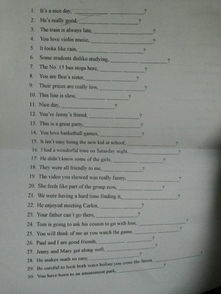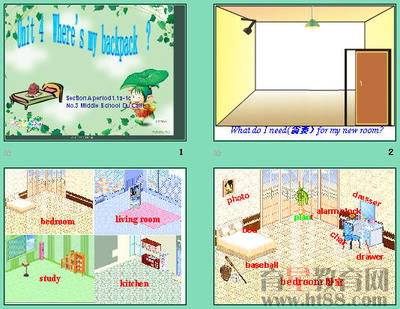高中英语语法:反义疑问句的用法
1.当陈述部分的主语是I,而句子又用来征询对方的意见时,附加疑问句中的主语用you。如:
I find English very interesting, don’t you?
I don’t like that film, do you?
2.当陈述部分的主语是everybody, everyone, someone, nobody, no one, somebody等合成代词时,附加疑问句中的主语通常用they。但亦可用he,尤其是nobody, no one等作主语,具有否定概念时。如:
Somebody phoned while I was out, didn’t they?

Everyone enjoyed the party, didn’t they?
Nobody wants to go there, does he?
3.当陈述部分的主语是不定代词everything, nothing, anything, something时,附加 疑问句中的主语一般用it,不用they。如:
Everything seems all right now, doesn’t it?
Nothing is kept in good order, is it?
Something must be done to stop pollution, isn’t it?
4.当陈述部分的主语是指示代词this, that或these, those时,附加疑问句中的主语分别用it和they。如:
This is important, isn’t it?
That isn’t correct, is it?
These are your friends Tom and Jack, aren’t they?
5.如果陈述部分是以代词one作主语,附加疑问句中的主语在正式场合用one,非正式场合用you,在美国英语中,在非正式场合还可以用he。如:
One can’t be too careful, can one?或can you?
One should do his duty, shouldn’t he?
6.如果陈述部分用I’m…结构,附加疑问部分一般用aren’t I。如:
I am strong and healthy aren’t I。
7.当陈述句为there be结构时,附加疑问句中的主语也用there。如:
There’s no help for it, is there?
There’s something wrong, isn’t there?
8.陈述部分带有seldom, hardly, never, rarely, few, little,nowhere, nothing等否定词或半否定词时,附加疑问部分的动词用肯定形式。如:
Bob rarely got drunk, did he?
Few people know him, do they?
She seldom goes to the cinema, does she?
如果陈述部分的否定词带有否定前缀,那么,该陈述部分作肯定处理,附加疑问部分一般仍用否定形式。如:
He was unsuccessful, wasn’t he?
Tom dislikes the book, doesn’t he?
9.当陈述部分为主从复合句时,附加疑问部分一般应与主句的主语和谓语动词保持对应关系。如:
She says that I did it, doesn’t she?
I told them not everybody could do it ,didn’t I?
但当陈述部分的主语是I,谓语是think, believe, suppose, expect这类动词时,附加疑问部分则往往与从句中的主语和谓语动词保持对应关系,但要注意否定的转移。
I suppose that he’s serious isn’t he?
I don’t think she cares, does she?
10.当陈述部分是并列句,附加疑问句则需和就近的分句的主语和谓语一致。如:
Xiao Lin has been writing letters all afternoon but he should finish them now, shouldn’t he?
11.在由“祈使句+附加疑问”构成的附加疑问句中,附加疑问部分一般用will you, won’t you, would you,有时也可用can you, can’t you, why don’t you, could you等。如:
Don’t open the door, will you?
Give me some cigarettes, can you?
Take a rest, why don’t you?
但是,以let’s开头的祈使句,附加疑问部分用shall we;以let us开头的祈使句,如果含义是allow us,不包括听话人在内,疑问部分用will you。如:
Let’s have a basketball match this afternoon, shall we?
Let us go out for a rest, will you?
12.当陈述部分带有情态动词must表示“必须”时,疑问部分用mustn’t。如:
You must work hard next term, mustn’t you?
I must answer the letter, mustn’t I?
但若表推测这层含义时,不能用must,而要根据陈述部分的不定式结构(即must之后的动词)以及含义采用相应的动词形式。如:
You must have made a mistake, haven’t you?
They must have seen the film last week, didn’t they?
He must be in the library, isn’t he?
13.当陈述部分含有情态动词used to时,疑问部分可用usedn’t或didn’t。如:
The old man used to smoke, didn’t he?或usedn’t he?
Tom used to live here, usedn’t he?或didn’t he?
14. 当陈述部分带有情态动词ought to时,疑问部分用oughtn’t或shouldn’t。如:
He ought to know the answer, oughtn’t he?
We ought to read this book, oughtn’t we?或shouldn’t we?
15.当陈述部分含有had better时,疑问部分用had。
如:
 爱华网
爱华网


